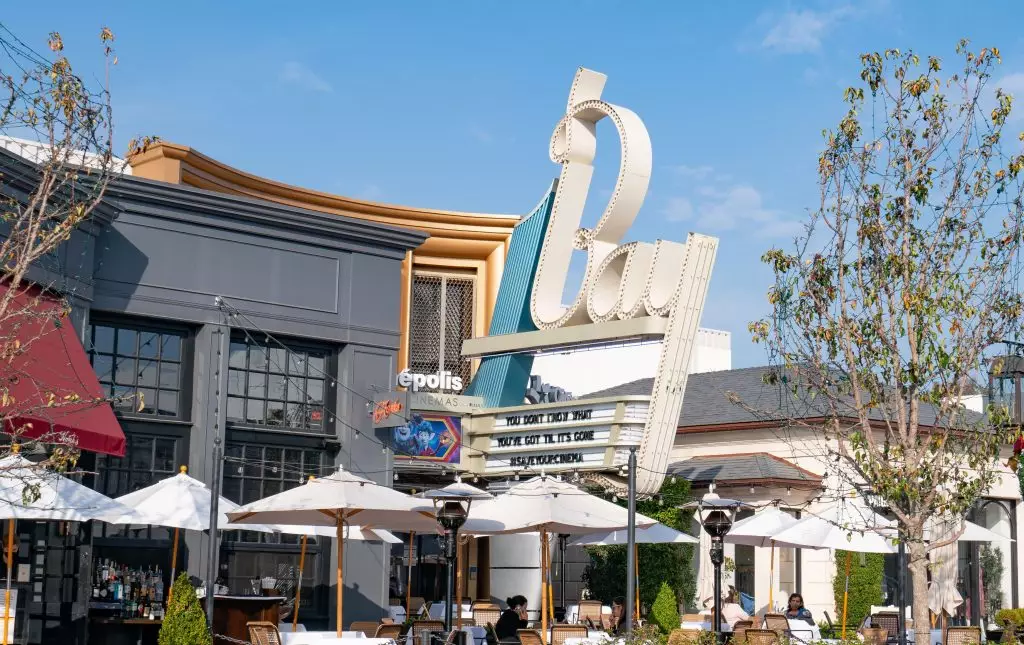The recent wildfire in Pacific Palisades has created ripples across the entertainment landscape of Los Angeles, a city renowned as the epicenter of film. With the flames leaping dangerously close to many cultural institutions, the fire has resulted in the temporary closure of numerous local cinemas, highlighting both the fragility of Hollywood’s infrastructure and the broader implications for moviegoing in a region that has long prided itself on the cinematic experience.
The Evacuation of Theaters: Immediate Effects
As of now, several well-known movie theaters in the Los Angeles area have had to shut their doors in direct response to the wildfire. Notable among these are the AMC Americana in Glendale, the popular AMC Universal City Walk, and the Regal Sherman Oaks. The closures highlight a troubling reality: the volatile nature of natural disasters and their ability to disrupt even the most established entertainment venues. Although the Bay Theater, situated in the heart of the affected area, appears to have escaped physical harm, its operational status remains uncertain. The theater, owned by business mogul and mayoral candidate Rick Caruso, serves as a stark reminder of how private investments intersect with community safety amid calamity.
The Bay Theater, operated in conjunction with Netflix, is under particular scrutiny given its historical significance to the local community. Caruso confirmed that while the theater itself was spared, the surrounding shopping center sustained damage, illustrating the catastrophic consequences of the fire for surrounding businesses. The uncertainty surrounding reopening dates leaves a question mark over the immediate future of the moviegoing experience for Angelenos, who are already facing a difficult climate for cinema attendance.
Shifting Tides in Moviegoing Sentiments
As evacuation orders continue to be enacted in and around damaged areas, a prevailing sentiment has emerged among potential moviegoers: hesitation. Recent surveys suggest that the allure of cinemas is dampening, as people are understandably more inclined to prioritize safety over leisure activities. This worry comes at a critical time for an industry that relies on ticket sales; last year, the Los Angeles market raked in a staggering $681 million, contributing to around 8% of the total domestic box office.
Without question, this wildfire is jeopardizing that revenue stream. The immediate onset of these closures during a deeply competitive window in which cinematic releases such as Lionsgate’s *Den of Thieves 2: Pantera* and Paramount’s *Better Man* are set to debut creates a significant obstacle for studios eager to maximize box office returns. Projections indicate these films will struggle to draw crowds, with expected weekend grosses ranging from $11 million to $13 million—a disappointing return considering the wider potential in a more favorable environment.
The Pacific Palisades wildfire is not just a localized issue; it acts as a harbinger for the film industry, challenging how movies are marketed and consumed in regions affected by natural disasters. With multiple industry events, including high-profile premieres, being canceled or postponed, the fallout from the fire extends beyond immediate theater closures. The Critics Choice Awards, a significant barometer for film industry sentiment, pushed its date to January 26, further indicating a shift in priorities when it comes to public safety versus entertainment.
As Los Angeles looks toward rebuilding not just infrastructure but trust within communities, the path ahead involves assessing the long-term impacts of such natural disasters on the entertainment industry. Lessons drawn from this situation may well serve as guideposts for future responses to calamities, shaping the future contours of moviegoing culture in a way that marries safety considerations with the cherished tradition of cinematic storytelling.
The Pacific Palisades wildfire represents much more than a temporary setback for Los Angeles’ cinemas; it symbolizes the ongoing dialogue between nature, safety, and the evolving dynamics of an industry that thrives on community engagement and shared experiences. As the community looks to recover, the resilience of the moviegoing culture will undoubtedly be put to the test.

